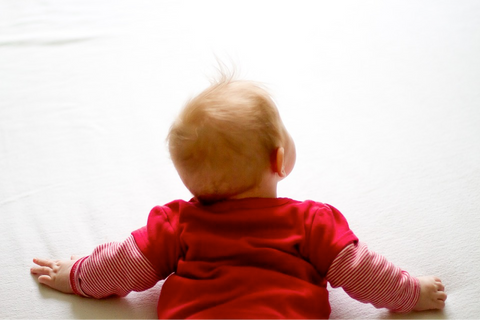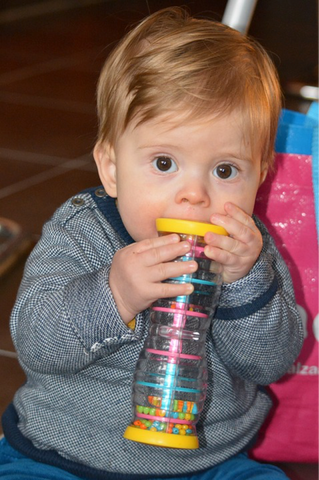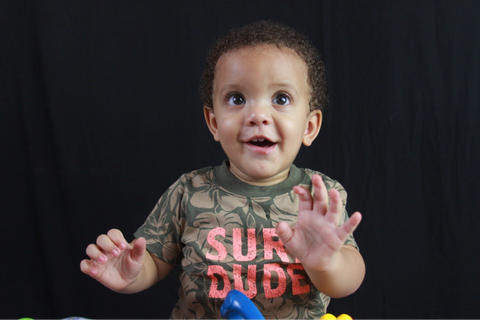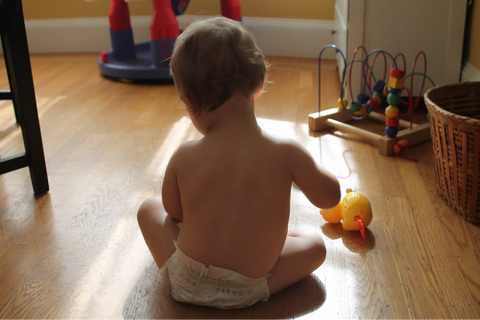Somedays you catch yourself observing your one-year-old and think, why? Let’s just state the obvious here and agree that babies can be weird sometimes. Although most of our babies quirks are just that, quirks, sometimes our minds can race and we begin to question whether their behavior is normal, or if there is actual cause for concern. Below, advice from child development experts and our own personal experience provides answers to the top four pressing questions all new dads have for their one-year-old babies.
Oh God did I raise a hipster? Why are you crawling backwards?

According to Selena Burgess, author of the Disney Baby and child development expert, “Crawling is a huge milestone for your baby – promoting muscle development, self-confidence, and motor development. The style of a baby’s crawl is purely personal. Some take on the belly crawl, some the scoot’n’boogie, the leapfrog, or even the backward crawl.”
Babies opt for the most energy efficient way to crawl. It's common for a baby's arms to be stronger than their legs at first, which means they may push backward. If you want to promote your baby crawling in a forward direction, entice them by putting their favorite toy in their front view but just shy of arm's reach. It’s important to remember that each baby’s development is unique and complex, and therefore, there is no one fixed “right way” to measure their development. Your baby may eventually get the hang of going forward, or they may not — either way, it's nothing to worry about.
Would you say plastic has a mild or gamey flavor?

Oral exploration is an important stage that lasts for a long, long time – so get used to it! During this key developmental stage, babies will put everything from toys to household items in their mouths in attempts to discover the taste and textures of different objects. Everything is new and exciting for them at this time, and because their inability to stroke, poke and prod with their fingers impairs the quality of exploration through touch, babies resort to using their other four senses to get answers. Their mouths, in particular, have more nerve endings per square millimeter than any other part of their body, allowing them to get the best sense of what an object feels like when it’s in their mouths. Constant display of mouthing objects can also be a sign that your baby’s first tooth is ready to surface. There is very little you can do to prevent your baby from trying to put everything within reach in their mouths, so your best bet is to keep a close eye and sterilize their toys as often as possible.
Are you practicing your selfie faces over there?

The range of faces a baby can make can be quite comical at times. You get a kick out of watching these silly faces, but sometimes you wonder if these expressions are a way of communicating that something is wrong. The are a number of reasons why they make these funny faces. For one, their eyesight is developing which means they have poor eye muscles that result in contorted faces as they attempt to focus and see. Not only are their eye muscles weak, but their developing facial muscles are also weak, which can result in uncoordinated and amusing expressions. They are also mimicking faces they see around them, which means their eyes might widen when yours do, or their mouth might repeatedly open when you are talking. Most of the times these faces are harmless, but other times they can be signals of discomforting gas. Gas is often a culprit of fussy behavior, so if you do observe discomfort in their expressions, it is best to go see a doctor.
Hey buddy your hands are reaching pretty south, do you need a moment alone?

According to DeAnn Daives, the director of child development at Scottsdale Healthcare in Arizona, "It's very common to see babies start playing with their genitals around the five-to-seven-month mark. It means something very different to them than it does to us." Babies are driven to touch themselves out of simple curiosity, she explains: "They're such eager learners and explorers at that age—anything they can get their hands on is fair game.” Peter Vishton, Ph.D., head researcher at the Child Development Research Center at the College of William & Mary, in Williamsburg, Virginia adds, “If you think about it, your child is also playing a lot with his hands and feet, but it doesn't attract your attention the way it does when he touches his genitals."
The fact is, if your baby is spending more time down there than other places, it’s probably because it feels good. If the sight of your baby reaching south makes you squeamish, provide a distraction: Hand your child a toy when they are undressed so their hands are occupied and their attention is diverted. It’s important to realize that at this stage in development, babies are learning about their bodies through touch; so be accepting if a little fondling goes down.






Comments (0)
Back to Blog